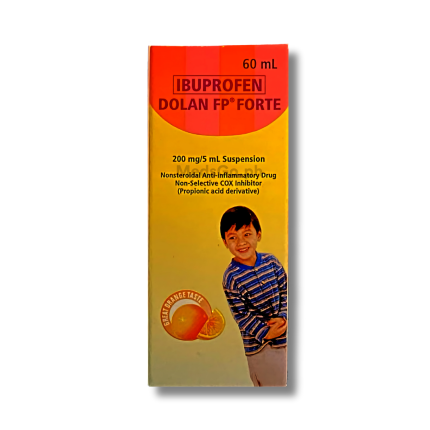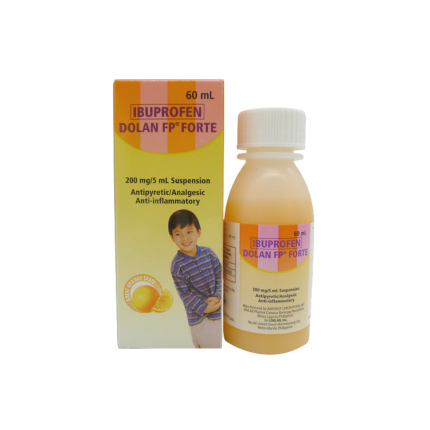All variations
Indications / Uses
DOLAN FP FORTE Ibuprofen for Kids is used for the relief of mild to moderate pain and for fever reduction. This non-steroidal anti-inflammatory drug (NSAID) helps manage discomfort associated with various conditions. It is effective for fever, headaches, toothaches, teething, and minor aches and pains due to the common cold or flu. The liquid suspension form is particularly suited for easy administration to younger patients.
Formulation / Ingredients
DOLAN FP FORTE Ibuprofen for Kids contains: Ibuprofen 200mg/5ml + Orange flavor
Do I need prescription to buy DOLAN FP FORTE Ibuprofen for Kids?
No prescription required to purchase DOLAN FP FORTE Ibuprofen for Kids. You can order it right now on our website.
Side Effects
DOLAN FP FORTE Ibuprofen for Kids common side effects include: stomach discomfort, such as nausea, indigestion, heartburn, and gas. Less frequent, but possible, effects involve the nervous system, such as headache, dizziness, and ringing in the ears. Serious, though rare, effects can involve the gastrointestinal tract (bleeding, ulceration) or the heart (risk of cardiovascular events), particularly with prolonged use or high doses. Discontinue use if unusual bleeding, swelling, or signs of a hypersensitivity reaction occur.
Directions and Dosage
Dosage is generally based on the patient's weight, with a typical single dose of 5 to 10 mg per kg of body weight.
- Dosage for Infants 6–11 months (5.5–8 kg): 1.25 mL (50 mg) as a single dose.
- Dosage for Kids 1–3 years (8–15 kg): 2.5 mL (100 mg) as a single dose.
- Dosage for Kids 4–6 years (15–20 kg): 3.75 mL (150 mg) as a single dose.
- Dosage for Kids 7–9 years (20–30 kg): 5 mL (200 mg) as a single dose.
- Dosage for Kids 10–12 years (30–40 kg): 7.5 mL (300 mg) as a single dose.
- Dosage for Adolescents and Adults (40+ kg): 10 mL (400 mg) as a single dose.
Doses may be repeated every 6 to 8 hours. The maximum total daily intake should not exceed 4 doses in 24 hours. The product is not for use in infants under 6 months of age. Treatment duration should be limited to 3 days for fever and 5 days for pain.
Contraindications
Use is not advised in cases of severe allergic reactions to any non-steroidal anti-inflammatory agents. Avoid use if there is an active or recurrent history of peptic ulcer disease or gastrointestinal bleeding. It should also be avoided by individuals with severe heart, kidney, or liver function impairment, or during the final 3 months of a pregnancy. It is also not suitable for patients with conditions involving an increased bleeding tendency.
Use in Pregnancy and Lactation
Use during the last trimester of a pregnancy is not advised as it may harm the fetus and cause delivery complications. Use in the first and second trimesters should be considered only when clearly necessary. Very low concentrations of the active substance pass into breast milk, making adverse effects on the infant unlikely.
Special Precautions
- Pre-existing conditions like asthma, chronic kidney or liver dysfunction, or high blood pressure require careful consideration.
- Use should be avoided in dehydrated individuals as there is a risk of kidney issues.
- Patients with systemic lupus erythematosus (SLE) or other mixed connective tissue disorders.
- Higher doses or prolonged use may increase the risk of cardiovascular events.
Is it safe to take it with other medications?
Concurrent use with other non-steroidal anti-inflammatory agents, including aspirin, is not advised. The product may reduce the effectiveness of certain medications for high blood pressure or affect the efficacy of blood thinners, requiring monitoring.
How should I store it?
Store at a temperature not exceeding 30°C. Keep the container tightly closed and out of sight and reach of children. Protect the bottle from moisture and direct light.
Used For
- Fever, Pain, Inflammation
Age
- From 6 months
Features
- Ibuprofen
Reviews
No reviews found
Questions about DOLAN FP FORTE Ibuprofen 200mg / 5ml Suspension 60ml Orange answered by pharmacists







